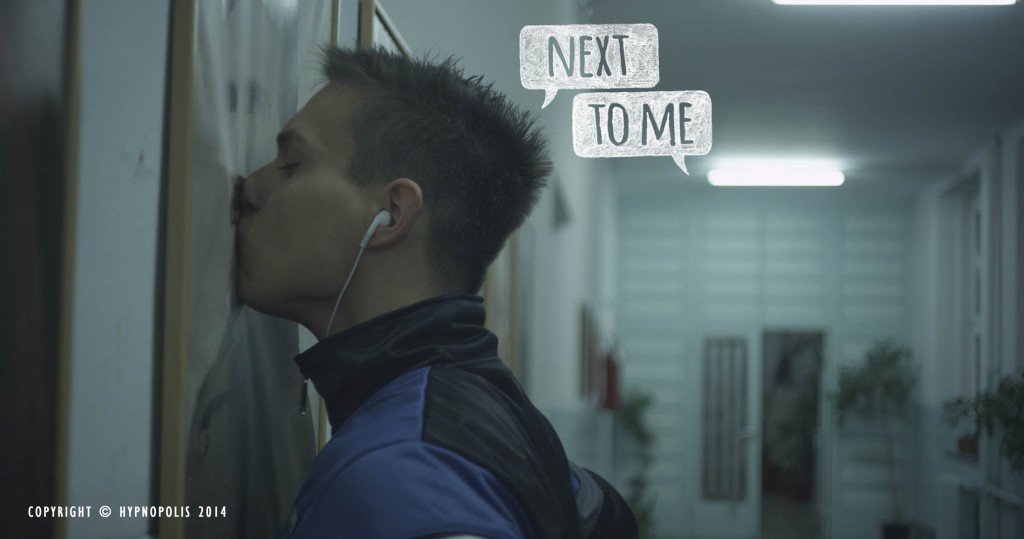Gay hate jeopardised film about Serbia’s ‘lost’ generation
 A film about the failings of Serbia’s education system for the country’s so-called ‘lost’ generation was nearly halted by homophobia among its young Belgrade cast, provocative director Stevan Filipović said.
A film about the failings of Serbia’s education system for the country’s so-called ‘lost’ generation was nearly halted by homophobia among its young Belgrade cast, provocative director Stevan Filipović said.
The prominent Serbian director is no stranger to controversy, having received death threats and faced reprisals after the high-profile release of Skinning (Šišanje), his notorious portrayal of the rising threat of neo Nazis in Belgrade.
Even that could not prepare him for the prejudice and ignorance when casting a young gay role in his new film, Next to Me (Pored mene).
“Living in Serbia, I did expect problems with the teen gay roles in Next to Me, but nothing could have prepared me for what was in store,’ he told Wild Rooster.
Homophobia in Belgrade Academy of Art
The shock was so great that Stevan wanted to pull the plug on the project before filming even began. “The actor I had chosen for a lead role flat out refused to play a gay character,’ Stevan said. “Talking and reasoning and all the arguments didn’t help. I was devastated and wanted to shut down the project.”
What Stevan found so disturbing was that these young students were part of an innovative actors course at the Belgrade Academy of Arts, fronted by one of the Balkans’ leading actresses and outspoken human rights activist Mirjana Karanović.
“I was thinking, if this is how the students of an art academy think, actor students of Mirjana Karanovic no less, who is very politically vocal and an active fighter for human rights, then what should I expect from others?
“I have been working at the Academy of Arts for two years now,’ said Stevan. “Mirjana called me to be her assistant and to work with her students to help them understand the differences between acting in theatre and acting on film.
“Most art schools in Serbia have fairly good acting curriculums, but primarily focus on theatre, so you have many talented young actors and actresses struggling when they are faced with a movie camera for the first time. Mirjana thought that I, as a movie director, could help with that. This film is a direct result of that work.”
What started as a student graduation project has grown into a fully-fledged cinema release, Next to Me (Pored mene). “The students were my initial inspiration for most of the characters,’ said Stevan.
“During classes, I saw character traits in each of them that I found interesting and very soon sketched their film alter-egos based on that. Mirjana was their acting coach, working with them for four years at the Academy. She knew them, their strengths and weaknesses, and that was invaluable.
Uncompromising violent attack by Serb nationalists
“We had very detailed conversations about their own experiences in high school, their perspectives on life, love, politics and so on, and I used that to further develop the characters in our fictional class and wrote the first draft of the screenplay.”
The film has already attracted a lot of attention due to its uncompromising storyline which is kicked off by a violent attack by a group of young Serbian nationalists on a liberal artist and the inclusion of a gay schoolboy as a lead character.
“Casting the gay character was quite shocking for me,’ said Stevan. “You should understand that there are no openly gay actors in Serbia but you wouldn’t believe the disturbing conversations we had with most of the candidate actors for the role.
“They would say, ‘I don’t want to play a gay,’ and I would reply, ‘You are not playing a gay, you are playing a human being, who just happens to be gay.’ I was shocked that these otherwise bright young people would come back with, ‘I don’t care. I get sick just thinking about them.’ It was horrific to hear them speak in this way. We had a dozen refusals.”
Racism and homophobia among Serbian actors
Sadly, meeting such prejudice among Serbian actors at the casting stage was nothing new for Stevan. “We saw a lot of discrimination with my previous film, Skinning,’ he said.
“We were trying to cast the young Roma victim role and we were having a lot of problems with racism,’ he said. “I was furious. I remember saying to one kid who didn’t want his first role to be a Gypsy: ‘Do you fucking realise what are you saying? Do you understand that I will quote you in all public interviews until the end of my life?’
“Most of the actors we met were afraid to be typecast or, worse, labelled for life by people in Serbia just because they would be seen playing someone with darker skin. It was really very disturbing for me.”
Such experience ensured that, this time, Stevan was better prepared to confront the root cause of the prejudice.
“With so many young actors refusing to play a gay character, I became so aggressive in writing them off as a generation of complete retards that it took me some time to realise that I was doing exactly the opposite to what I was preaching through the character of the teacher in this film. I wasn’t giving them a chance and I needed to deal with that.
“We realised most of these kids had never actually had a meaningful conversation with a gay person, didn’t have a gay friend and didn’t really know the very basic facts. Some of them were just repeating what they had heard on TV or read in a tabloid newspaper. So, we softened the approach. We armed ourselves with more arguments and more patience, and in the end, we found the most amazing and brave actors for the roles.”
Teenage gay Serbia informs young actors
When Stevan and Mirjana set out on this project, they could not have anticipated the need to educate students on the realities of life for gay people in Serbia. But that is exactly the challenge that they found themselves taking on.
“In cooperation with a local NGO called E8 we organised a really great workshop with the kids, which was ultimately very important,’ said Stevan. “We worked on characters and storyline, but also talked about LGBT rights and had lectures and discussions about the social and political aspects of the movie we were making.
“Most importantly, we had group readings of the actual forum posts of gay teens in Serbia talking about their experiences in high school. It was really heavy stuff, even for us who already thought we had a good idea and open mind.
“Only after that insight did many of our actors begin to shift their opinions about the subject.
“We wanted to give these young actors the ability to articulately defend their characters and, sort of, become activists when the film comes out. We formed really strong bonds with the cast during that process.”
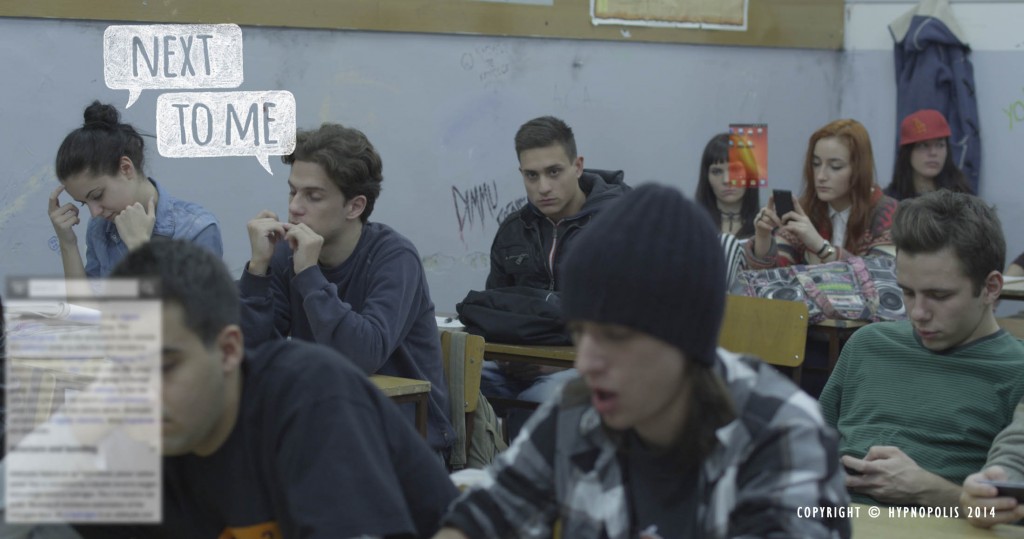 While the storyline was bound to cause controversy in Serbia, Stevan’s dealings with public opinion and media comment on his previous film Skinning (Šišanje) meant that he was unafraid to tackle the issues head on. Indeed, experience drove him to address gay rights as a theme for this film.
While the storyline was bound to cause controversy in Serbia, Stevan’s dealings with public opinion and media comment on his previous film Skinning (Šišanje) meant that he was unafraid to tackle the issues head on. Indeed, experience drove him to address gay rights as a theme for this film.
Orthodox Church protects violent opponents of Belgrade Pride
“The premiere of Skinning (Šišanje), was only four days before the now infamous Belgrade Pride Parade 2010,’ he said. “That was the only Serbian Pride so far that actually happened, as all subsequent ones were banned by the state, but it ended in horrific violence. There was lots of blood on the streets and the centre of Belgrade was demolished.
“The hooligans that perpetrated the violence were directly responsible, but they were given tremendous support and complicit protection by the Orthodox Church and all the right wing and nationalist groups, which are, unfortunately, still mainstream in Serbia.
“Skinning was dealing exactly with these issues: how a young man becomes a puppet in the hands of these nationalist groups. So seeing scenes from the film literally happening on the streets of Belgrade, just a few days after the premiere, was a horrible experience.”
The lasting impact of that time led to Stevan forming an even clearer perspective on the state of his country.
Far right ideology equates Serbia with Putin’s Russia
“That the ordeal helped me gain a better understanding of how far right ideology has become so grounded and so mainstream in my country,’ he said. “It is all connected, and gay people are just the latest target in Serbia, much like in Putin’s Russia.
“The patriarchal, traditional mind set and the right wing propaganda through the years have resulted in more than 70% of Serbians thinking that being gay is a disease, and that gays are ‘imported from the decadent West’. This is a country in the middle of Europe in which 38% of high school students would openly justify violence against LGBT people, and only 16% think they should have equal rights.
“So it was not hard to imagine a story that tries to explain what a gay teenager must be feeling growing up here, surrounded by such fierce homophobia.
“To say it in high school terms – Skinning was dealing with the bullies, and in Next to Me, the multiple storylines show the perspective of the victims.”
Serbian nationalists attack liberal Belgrade artist
Like Skinning, this latest film has been attracting attention due to its difficult storyline, as Stevan outlined.
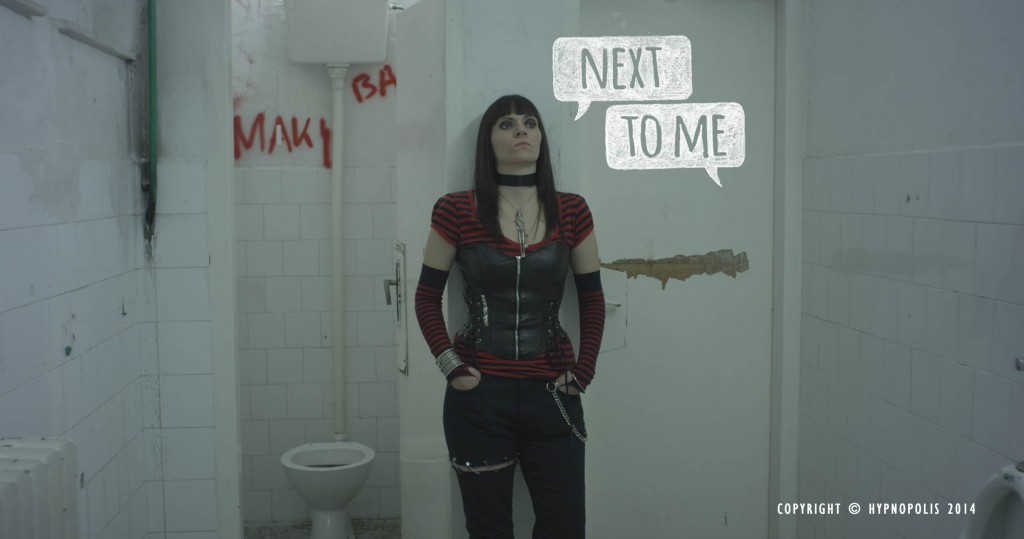 “Next to Me begins as a story about Olja (Hristina Popovic), a young, ambitious, high school history professor interested in alternative methods of education. She is married to a painter whose latest exhibition has provoked public outrage and been labelled as blasphemy and an insult of religious feelings by Serbian nationalists.
“Next to Me begins as a story about Olja (Hristina Popovic), a young, ambitious, high school history professor interested in alternative methods of education. She is married to a painter whose latest exhibition has provoked public outrage and been labelled as blasphemy and an insult of religious feelings by Serbian nationalists.
“One night, a group of masked hooligans attacks Olja in a parking lot. They film the attack and then upload the clip to YouTube. The next day Olja discovers that some of her students were responsible for the attack. She takes away their mobile phones, and in the heat of the moment decides to lock them in the school building, also disconnecting the school phones and the internet.
“From this moment on, the film transforms to a personal story about the characters in her class. They are the so-called ‘lost generation’ in Serbia – kids who were born during the nineties, and were too young to understand the wars and all the bad things happening around them, but now they are living with the consequences.
Children of the digital revolution
“They are also children of the digital revolution, now taken out of their natural habitat by having their phones taken away. In order to solve the problem together, and unable to leave the building, the students actually begin to communicate.
“During one winter night, their individual stories and destinies stand out from the group and, collectively, I hope that they will paint an honest and vivid picture of our broken society. Hopefully, this will be a testament to a generation that was written off before they were even given a chance.”
If this all sounds a little familiar, Stevan’s influences should not come as any great surprise.
“Of course, my story framing device is an homage to John Hughes’ The Breakfast Club,’ he said. “Also, films of Robert Altman were a huge inspiration in teaching me how to successfully deal with so many characters and storylines, and still retain a coherent narrative. Of course, as the story progresses, we focus on a few main characters from the class and share their stories.”
“Also, I saw a play called Macho Men in Bitef Theatre. It was a true revelation; something that I thought was really missing in modern Serbian theatre. I immediately asked one of the authors, Minja Bogavac, to be my co-writer on the film. They were using a similar technique, with the main protagonists were also co-creators of their characters. So we rewrote the script together and four kids from Macho Men were even cast in our film.”
Authoritarian approach of educated classes
Stevan wrote the role of Olja for his former schoolmate-turned actor Hristina Popović. “She was my first and only choice,’ said Stevan. “We are old friends, we were in the same class in elementary school, but we haven’t ever worked together.
“The whole experience of making this movie was a really weird flashback for the two of us. It was really strange and emotional to be back in the classroom, together, after all these years.
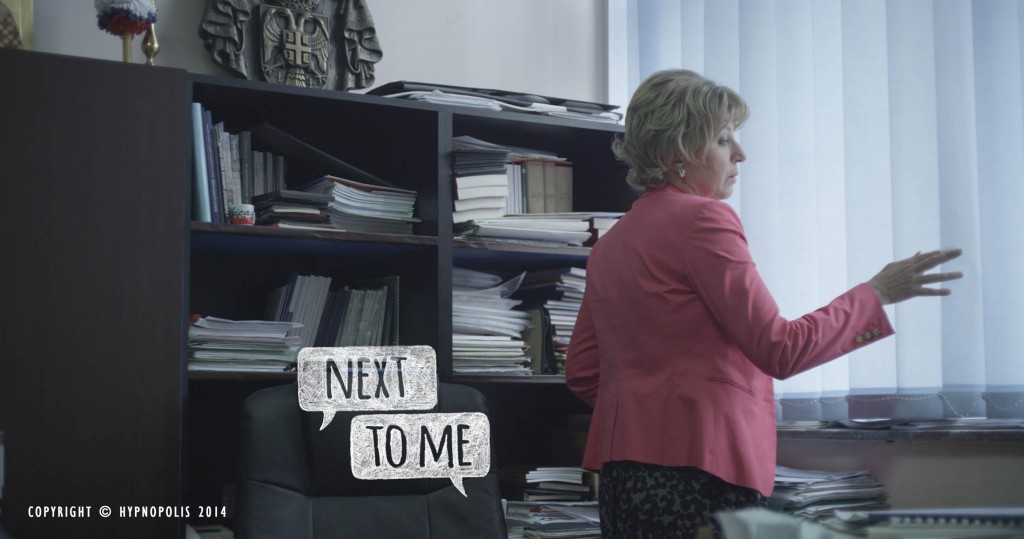 While traits of many of Stevan’s students are reflected in their on-screen characters, principled teacher Olja is based in Stevan himself. “Olja is sort of my alter ego in this film,’ he said. “She was actively involved in the protests against Milosević, she got a liberal education from a few good professors at a state university and began her career with high hopes that she could really change things.
While traits of many of Stevan’s students are reflected in their on-screen characters, principled teacher Olja is based in Stevan himself. “Olja is sort of my alter ego in this film,’ he said. “She was actively involved in the protests against Milosević, she got a liberal education from a few good professors at a state university and began her career with high hopes that she could really change things.
“She finds, though, that this is in a sharp contrast with the apathy of her students, and the political views of the school principal (Mirjana Karanovic).
“Olja really wants to communicate with these kids, to give them a fighting chance in life. She feels closer to her students than to most of her older colleagues, but still, there is an undeniable generational gap between them.“It’s very tricky to choose the right approach. She doesn’t want to be their friend, and yet she fights hard not to employ the authoritarian approach many of her colleagues prefer. I can relate to that.
Assassination of Prime Minister Djindjic
“She still has the naive, idealistic approach that is very characteristic of my generation. We were raised on the hope that change was indeed possible, and that Milosevic was the only thing standing in the way of progress. But, sadly, we have seen all shades of grey in the meantime, especially after Prime Minister Djindjic was killed.”
Revered actress and acting course chief Mirjana Karanovic has been heavily involved in this project from the offset. “In the film, Mirjana plays the school principal,’ said Stevan. “She is an old-school headmistress from the Milosević era, who came back to power after her party won the elections again.
“She is very pragmatic and disillusioned, and sceptical about modern technology: the kind of dinosaur that doesn’t know how to send an email, but still presumes that her way is the right way. Needless to say, her and Hristina’s characters are in perpetual conflict.
Difficulties financing controversial Serbian films
Financing any film in Serbia takes tenacity and luck in almost equal measure. When the subject matter is as volatile at Next to Me, a heavy dose of commitment and industry foresight is also required by the investors, as Stevan explained.
“This project couldn’t have happened if Branislav Jevic of Hypnopolis Films, who produced my previous two films, hadn’t accepted my offer to be producer of Next to Me. I am very glad he did, as it is very rare in Serbia that someone is willing to risk his private money in the movie business.
“Usually, most authors depend on state funds, which are scarce, and usually very hard to get, unless you’re politically connected.
“We applied for post-production funds and were granted half of the sum that we needed. That still leaves us with a problem, but it is actually great news that we got anything at all. And it was very unexpected, especially considering the themes we deal with in the film, which are, at best, actively avoided by mainstream media.”
Skinning director praises Brankica Stankovic
After the notoriety of Skinning, were you anxious about making another film that would be seen as controversial for many people in Serbia? Or did that energise you? If you could do that, you could do anything?
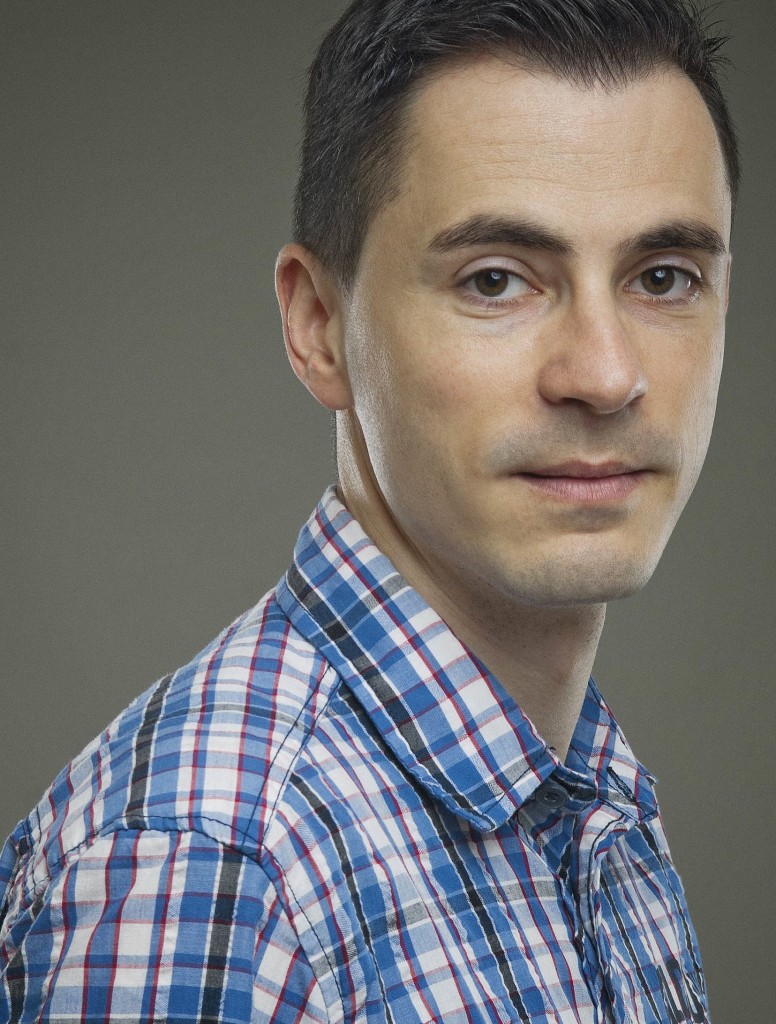 “Well, one of the big influences for Skinning was a TV show called The Insider, made by an unbelievably brave journalist, Brankica Stankovic,’ Stevan said. “She was tackling all the hot topics of the moment, from the political background of the assassination of Prime Minister Djindjic and role of the state in hiding war criminals, to the connections between drug dealers and police in football mafia.
“Well, one of the big influences for Skinning was a TV show called The Insider, made by an unbelievably brave journalist, Brankica Stankovic,’ Stevan said. “She was tackling all the hot topics of the moment, from the political background of the assassination of Prime Minister Djindjic and role of the state in hiding war criminals, to the connections between drug dealers and police in football mafia.
“She was gathering hard evidence, doing the job of the police and courts, who were either too afraid, too blackmailed or too involved to handle these cases. Brankica was exposing dangerous criminals on a weekly basis and had received so many death threats that she is now living with 24hr police custody. Justifiably, she was awarded Courage in Journalism Award by IWMF this year.
“Even in times when we received our fair share of death threats and had to reach out to the police to secure the premiere of Skinning, I was always thinking that was she was doing was the real bravery. We were making fictional films and this woman is risking her life on a daily basis, naming names and pointing fingers on live TV.
Serbian nationalist death threats
“When I asked her how she copes with all that, she said, ‘But, I’m only doing my job, that shouldn’t be called bravery. I’m doing nothing more than telling the truth.’ Now, imagine how easier her life could have been – how all our lives could be – if all her colleagues were thinking like that.
“I think Brankica’s simple truth should also apply to our line of work. As filmmakers, we should strive to be honest: to ourselves, to our characters and to the reality of the world that we’re living in. I don’t think we should let ourselves be governed by fear or threats.”
Next to Me should begin screenings at international festivals in 2015.
